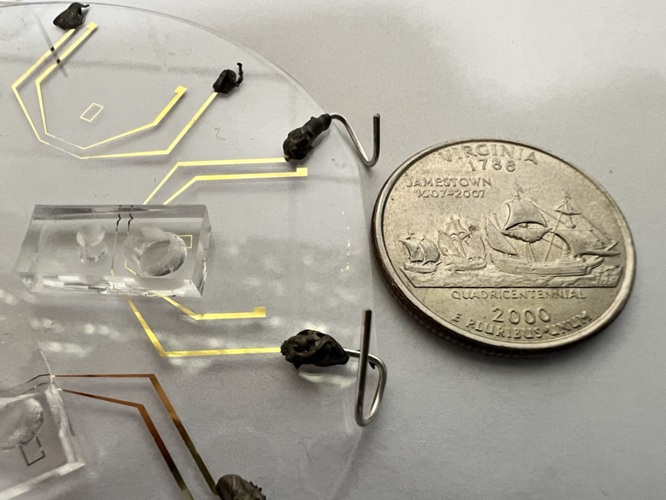Portable Device Detects Rare Genetic Mutations from Single Drop of Blood
Posted on 11 Jun 2025
Current genetic testing methods often take days or even weeks to detect rare mutations, delaying timely diagnosis and treatment, especially for conditions like hereditary transthyretin amyloidosis, which can lead to heart failure in people of West African ancestry. To address this urgent need for faster, accessible diagnostics, researchers have developed a portable device capable of detecting specific genetic mutations from just one drop of blood, delivering accurate results in under 10 minutes.
The innovation comes from a team led by engineers at Rutgers University-New Brunswick (New Brunswick, NJ, USA) and Yale University (New Haven, CT, USA), and is detailed in a new study published in Communications Engineering. The goal was to bring the lab-level accuracy of a traditional polymerase chain reaction (PCR) test to point-of-care environments, including doctors' offices, homes, and community centers. The device functions by combining a specialized version of PCR—called allele-specific polymerase chain reaction (ASPCR)—with a technology known as electrical impedance. It amplifies nucleic acid segments and uses a microchip to detect whether specific mutations are present. Electrical impedance measures how the DNA samples influence the flow of electricity within microfluidic chips, which are engineered to detect tiny variations in DNA or RNA sequences from blood samples. While standard PCR amplifies DNA broadly, ASPCR is designed specifically to detect point mutations—single-base changes in the DNA sequence that can lead to diseases such as sickle cell anemia, hemophilia, and certain cancers.

In lab testing, the team evaluated the device using blood samples from six patients and successfully identified whether or not they carried the transthyretin gene mutation. These early tests demonstrated both speed and accuracy, with the added benefit of portability, making it suitable for use outside traditional lab settings. ASPCR can be tailored to detect many specific genetic mutations tied to diseases. In addition, microfluidic chips can be designed to detect different types of DNA or RNA sequences, giving them great potential for detecting various diseases. The researchers are now working to enhance the sensitivity and specificity of the system.
Future iterations aim to detect up to 20 different point mutations in a single test, creating a broad-spectrum diagnostic platform. The adaptability of ASPCR and the customizability of microfluidic chips offer the potential to screen for a wide range of genetic disorders with a single drop of blood. Currently, the ASPCR analysis—which enables the amplification of DNA mutations directly from a small blood sample—is performed externally, outside the microfluidic microchip. Once this step is complete, the resulting amplified DNA is then detected by the microchip. The ultimate objective is to integrate both the ASPCR process and the electrical detection onto a single microchip platform.
“What we've figured out is how to make a device that has the potential to bring a kind of PCR testing, particularly in the context of detecting rare mutations, home, like a glucometer,” said Mehdi Javanmard, an author of the study. “This technique holds great promise for detecting a variety of diseases, thanks to its versatility, speed and potential for cost-effective and portable diagnostics.”














